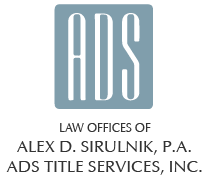
Relative to many residential lease agreements, commercial lease agreements are generally years-long commitments. Signing to one means agreeing to its provisions for several years (some as many as 10 years), so you want to be sure the terms are favorable. If they do not align with your business needs and goals, it’s time to negotiate (and you should know that all terms are negotiable).
Commercial Lease Pitfalls
Before committing to a commercial lease agreement in Florida, it’s essential to review the entire agreement carefully and feel confident that you understand its provisions.
If any of the following warning signs creep up, take heed. To ensure your interests remain protected when negotiating a commercial lease agreement, we advise working with a commercial real estate attorney. Our team at the Law Offices of Alex D. Sirulnik, P.A. is here to help.
- Hidden costs – Some lease agreements may try to obscure fees, such as maintenance fees, property taxes, insurance and common area maintenance (CAM) charges. Review your lease structure to understand your obligations. Triple net (NNN) leases are among the most common lease types in Florida. With these, the tenant pays rent, taxes, insurance, plus common area maintenance (CAM) expenses (for tips on negotiating NNN lease renewals, check out this post).
- Limited exit options – Understand the penalties or costs associated with early termination. Some leases may require payment of rent for the entire lease term, even if you vacate early.
- Proximity to competing businesses – This can be particularly important for retail locations but also may affect other industries. A tenant should consider negotiating exclusivity – that means restricting a landlord’s right to lease nearby spaces to businesses similar to yours.
- Rent escalation – Understanding how much rent will increase during the term of your lease is imperative for financial planning. Even small annual increases can impact your overall tenancy costs.
- Subletting restrictions – Review the lease to see if there are any subletting restrictions or if you can sublease the property to another party during your tenure in the property.
- Improvement restrictions – Some leases may restrict the tenant from making alterations or improvements to the property. On the other end of the spectrum, some landlords offer tenant improvement allowances for improving or modifying the property. Improvement allowances are generally fixed-figure amounts that do not need to be repaid and are calculated based on a property’s square footage, although there are restrictions to how the money can be spent.
- Personal guarantees – Some lease agreements may require you to provide a personal guarantee on the lease agreement in the event that your corporate entity were to fold or not be able to meet your lease obligations. Although most landlords will require it, it’s in your best interest not to do this. We recommend speaking with an experienced commercial real estate attorney before taking any action.
Before signing any commercial lease agreement, give us a call at the Law Offices of Alex D. Sirulnik, P.A. We will help you review and negotiate a strong and favorable commercial lease agreement for your Florida business.



